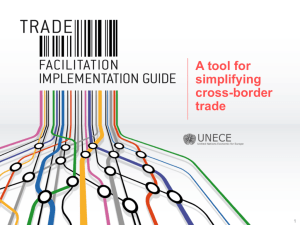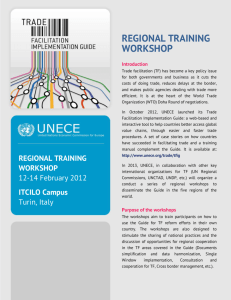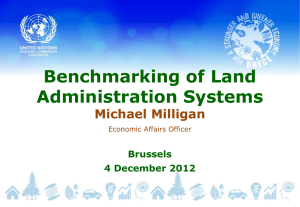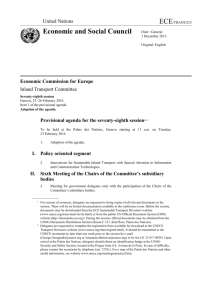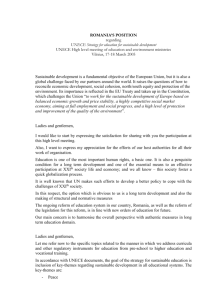UNCTAD Secretary-General's High-Level Multi-Stakeholder Dialogue on Commodities
advertisement
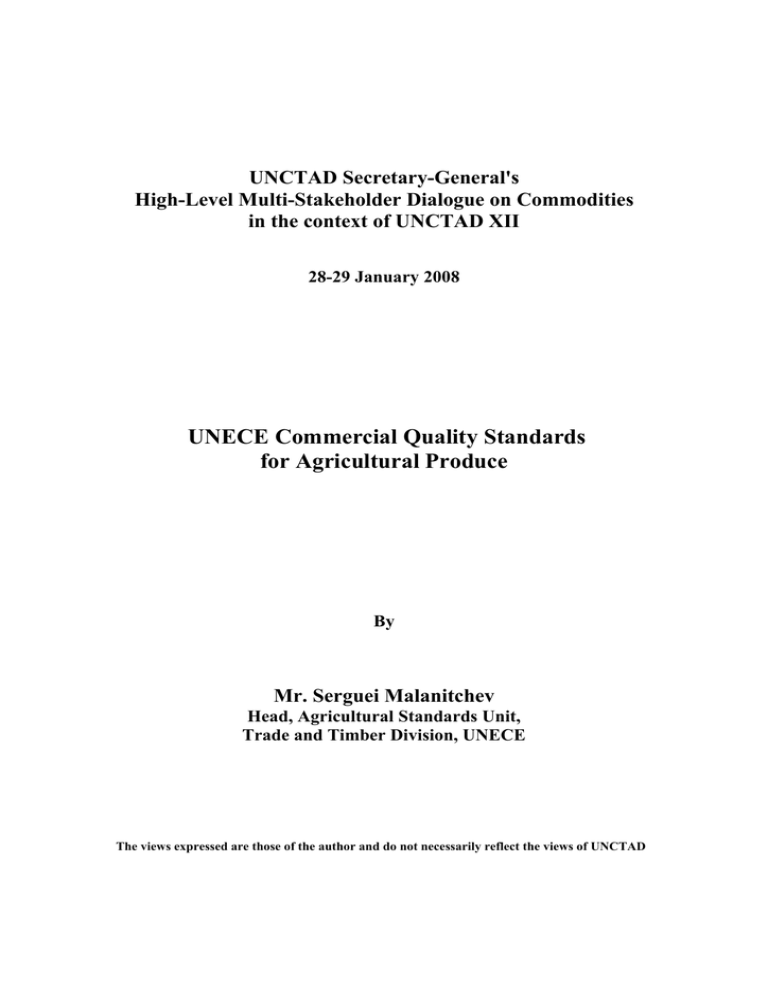
UNCTAD Secretary-General's High-Level Multi-Stakeholder Dialogue on Commodities in the context of UNCTAD XII 28-29 January 2008 UNECE Commercial Quality Standards for Agricultural Produce By Mr. Serguei Malanitchev Head, Agricultural Standards Unit, Trade and Timber Division, UNECE The views expressed are those of the author and do not necessarily reflect the views of UNCTAD UNECE commercial quality standards for agricultural produce Serguei Malanitchev, UNECE 1 UNECE international standards • Agricultural quality standards • Importance for international trade • How standards are developed and for which groups of products • Who uses them and where get training 2 United Nations economic Commission for Europe (UNECE) 3 UNECE mission • Facilitate economic integration and cooperation • Promote sustainable development and economic prosperity 4 UNECE work areas Transport Economic cooperation Statistics Housing Trade & timber Sustainable energy Environmental policy 5 UNECE standards are cost-free • Fruit and vegetables • Potatoes • Dry produce • Meat • Eggs • Flowers 6 International standards • Define common trading language • Simplify international trade • Create market transparency • Prevent technical barriers 7 For business • Clearer communication between buyer and seller • Easier price comparison for products from different sources • Confidence between contracting parties 8 For growers • Equal perceptions of quality levels • Homogeneity of products • Higher quality - higher profits 9 Higher quality – higher profits Category Price Quantity I (Euros/kg) (Kg) Value Quantity II Value (Euros) (Kg) (Euros) “Extra” 0.95 150 142.50 200 190.00 Class I 0.80 600 480.00 650 520.00 Class II 0.50 200 100.00 150 75.00 Other 0.20 50 10.00 - - 1000 732.50 1000 785.00 Total Per kg 0.7325 0.7850 10 For consumers • Protect the consumer 11 Mandatory or voluntary • Mandatory (in EU regulations or national legislation) • Voluntary (as reference in commercial contracts) 12 Users • • • • National authorities (all UN Member States) Producers Traders Consumer associations • International organizations 13 Agricultural standards within UN General Assembly Economic and Social Council Economic Commission for Europe Committee on Trade Working Party on Agricultural Quality Standards Specialized Sections on Standardization of Fresh Fruit and Vegetables Dry and Dried Produce Seed Potatoes Meat 14 Standard layout for FFV • • • • • • • Definition of produce Quality (“Extra” Class, Class I, Class II) Sizing Quality and size tolerances Presentation Marking Annexes (definitions, lists of varieties, testing and sampling procedures) 15 UNECE meat standards • Porcine, bovine, ovine, chicken, turkey, llama/alpaca • Describe meat items traded internationally • Define coding system for communication and electronic trade 16 UNECE standard for ovine meat 17 Standard ovine primal cuts 18 OECD Scheme on fruit and vegetables • Adopts UNECE standards as OECD standards • Develops explanatory material • Develops guidelines on conformity inspection • Organizes meetings for national inspectors • Carries out capacity-building activities 19 OECD explanatory brochures A. Minimum requirements In all classes, subject to the special provisions for each class and the tolerances allowed, the tomatoes must be: - intact: Tomatoes must not have any mutilation or injury spoiling the integrity of the produce. Damaged tomato - Not allowed 20 OECD explanatory brochures - sound; produce affected by rotting or deterioration such as to make it unfit for consumption is excluded. Tomatoes showing the following defects are therefore excluded: a) Marked bruises (soft patches) damaging the flesh occur due to rough handling and/or too tight packaging. Marked bruising - Not allowed www.oecd.org/agr/fv 21 International training • Bonn, Germany – International Meeting on Quality Control of Fruit and Vegetables • Guildford, United Kingdom – International Meeting on Harmonization of Interpretation of EC Marketing Standards and Procedures for Fresh Fruits and Vegetables • Mojmirovce, Slovakia – International Training Course on Harmonization of Fruit and Vegetables Quality Assessment 22 agristandards@unece.org http://www.unece.org/trade/agr/welcome.htm 23

